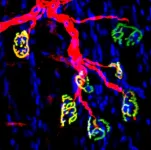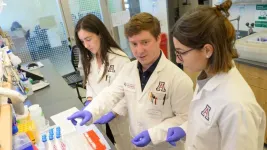(Press-News.org) A new study, jointly conducted by the University of Adelaide and University of Essex, has found that renting, rather than owning, a private-sector home leads to faster biological ageing.
The negative health impacts of renting were shown to be greater than those of experiencing unemployment or being a former smoker.
“Our findings demonstrate that housing circumstances have a significant impact on biological ageing, even more so than other important social determinants, such as unemployment, for example, and therefore health impacts should be an important consideration shaping housing policies,” said lead researcher Dr Amy Clair, from the University of Adelaide’s Australian Centre for Housing Research.
Biological ageing refers to cumulative damage to the body’s tissues and cells, irrespective of chronological age.
Some aspects of housing were linked with faster biological ageing regardless of whether a person rents or owns their home, including repeated payment arrears and pollution.
The researchers found it is likely that the insecurity and poor affordability of private rented homes is driving the link between renting and biological ageing.
“We hope to build on this work using data from different countries and exploring whether the association between housing tenure and biological ageing changes over time,” said Dr Clair.
The researchers also found the epigenetic impacts of renting are potentially reversible, making the implementation of health interventions for renters all the more necessary.
“Policies to reduce the stress and uncertainty associated with private renting, such as ending ‘no-grounds’ evictions, limiting rent increases, and improving conditions may go some way to reducing the negative impacts of private renting,” said the University of Adelaide’s Professor of Housing Research, Emma Baker, who also contributed to the study.
This study used data from surveys of 1420 adults in Great Britain and took into account elements of housing such as tenure, meaning whether a person rents or owns their home; building type; government financial support available to renters; the presence of central heating, as a proxy for adequate warmth; and whether the house was in an urban or rural area.
As this was an observational study on an all-white and European population, the researchers acknowledge there are limitations to their findings, but suggest they are likely to be relevant to housing and health elsewhere, particularly to countries with similar housing policies, such as Australia.
“There are many similarities between the housing policy approaches of the UK and Australia – private renters in both countries have very limited security of tenure and face high costs. It is therefore likely that private renters in Australia might also experience accelerated biological ageing,” said Dr Clair.
The study was published in the Journal of Epidemiology & Community Health.
A new study, jointly conducted by the University of Adelaide and University of Essex, has found that renting, rather than owning, a private-sector home leads to faster biological ageing.
The negative health impacts of renting were shown to be greater than those of experiencing unemployment or being a former smoker.
“Our findings demonstrate that housing circumstances have a significant impact on biological ageing, even more so than other important social determinants, such as unemployment, for example, and therefore health impacts should be an important consideration shaping housing policies,” said lead researcher Dr Amy Clair, from the University of Adelaide’s Australian Centre for Housing Research.
Biological ageing refers to cumulative damage to the body’s tissues and cells, irrespective of chronological age.
Some aspects of housing were linked with faster biological ageing regardless of whether a person rents or owns their home, including repeated payment arrears and pollution.
The researchers found it is likely that the insecurity and poor affordability of private rented homes is driving the link between renting and biological ageing.
“We hope to build on this work using data from different countries and exploring whether the association between housing tenure and biological ageing changes over time,” said Dr Clair.
The researchers also found the epigenetic impacts of renting are potentially reversible, making the implementation of health interventions for renters all the more necessary.
“Policies to reduce the stress and uncertainty associated with private renting, such as ending ‘no-grounds’ evictions, limiting rent increases, and improving conditions may go some way to reducing the negative impacts of private renting,” said the University of Adelaide’s Professor of Housing Research, Emma Baker, who also contributed to the study.
This study used data from surveys of 1420 adults in Great Britain and took into account elements of housing such as tenure, meaning whether a person rents or owns their home; building type; government financial support available to renters; the presence of central heating, as a proxy for adequate warmth; and whether the house was in an urban or rural area.
As this was an observational study on an all-white and European population, the researchers acknowledge there are limitations to their findings, but suggest they are likely to be relevant to housing and health elsewhere, particularly to countries with similar housing policies, such as Australia.
“There are many similarities between the housing policy approaches of the UK and Australia – private renters in both countries have very limited security of tenure and face high costs. It is therefore likely that private renters in Australia might also experience accelerated biological ageing,” said Dr Clair.
The study was published in the Journal of Epidemiology & Community Health.
END
Private renting is making you age faster
2023-10-12
ELSE PRESS RELEASES FROM THIS DATE:
Inhibiting an enzyme associated with aging could help damaged nerves regrow and restore strength
2023-10-12
Scientists at Stanford University School of Medicine and Sanford Burnham Prebys have demonstrated a new way to accelerate recovery from peripheral nerve injury by targeting an enzyme that was thought to be responsible for muscle wasting with aging.
Damage to the peripheral nervous system (the nerves that form the communications network between the brain, spinal cord and body) is debilitating; the effectiveness of physiotherapy as treatment is limited. Whether from trauma, disease or aging, nerve function declines and/or is lost, resulting in diminished strength and even paralysis.
In ...
New cyber algorithm shuts down malicious robotic attack
2023-10-12
Australian researchers have designed an algorithm that can intercept a man-in-the-middle (MitM) cyberattack on an unmanned military robot and shut it down in seconds.
In an experiment using deep learning neural networks to simulate the behaviour of the human brain, artificial intelligence experts from Charles Sturt University and the University of South Australia (UniSA) trained the robot’s operating system to learn the signature of a MitM eavesdropping cyberattack. This is where attackers ...
A better ‘map’ of the lights you see when you close your eyes can improve ‘bionic eye’ outcomes
2023-10-12
Researchers at Monash University have identified a new way of mapping ‘phosphenes’ – the visual perception of the bright flashes we see when no light is entering the eye – to improve the outcome of surgery for patients receiving a cortical visual prosthesis (‘bionic eye’).
Cortical visual prostheses are devices implanted onto the brain with the aim of restoring sight by directly stimulating the area responsible for vision, the visual cortex, bypassing damage to the retina of ...
Civics test policy fails to increase youth voter turnout, researchers find
2023-10-12
UNIVERSITY PARK, Pa. — A civics test policy mandated in 18 states that focuses on rote memorization and testing of political knowledge did not improve youth voter turnout as intended, according to Penn State College of Education researchers. As an alternative, they recommend a thorough integration of practical information on the voter registration process within social studies curricula.
“Providing students opportunities to really engage with what leadership means, having discussions and debates with leaders and politicians, mock elections… ...
Restoring nerve-muscle connections boosts strength of aging mice, Stanford Medicine study finds
2023-10-12
A small molecule previously shown to enhance strength in injured or old laboratory mice does so by restoring lost connections between nerves and muscle fibers, Stanford Medicine researchers have found.
The molecule blocks the activity of an aging-associated enzyme, or gerozyme, called 15-PGDH that naturally increases in muscles as they age. The study showed that levels of the gerozyme increase in muscles after nerve damage and that it is prevalent in muscle fibers of people with neuromuscular diseases.
The research is the first to show that damaged motor neurons — nerves connecting the spinal cord to muscles — can be induced to regenerate ...
NIA grant supports training of next generation of translational scientists for Alzheimer’s disease therapeutic development
2023-10-12
A prestigious National Institute on Aging training grant to develop a future workforce of research scientists in the field of Alzheimer’s disease and related dementias was awarded to researchers at the Center for Innovation in Brain Science at the University of Arizona Health Sciences.
Roberta Diaz Brinton, PhD, Regents Professor and director of the Center for Innovation in Brain Science, is principal investigator on Translational Research in Alzheimer’s Disease and Related Dementias, or TRADD, a five-year, ...
Birmingham Platelet Group delivers breakthrough ‘nanobody’ technology
2023-10-12
Researchers led by Professor Steve Watson and Dr Eleyna Martin from the Institute of Cardiovascular Sciences at the University of Birmingham have delivered a breakthrough for thrombosis researchers, by producing the first binding molecules (ligands) of defined composition to make platelets clump together in a predictable way.
The research team developed antibody fragments called nanobodies and crosslinked these to make ligands to four platelet receptors (GPVI, CLEC-2, FcɣRIIA and PEAR1).
The nanobodies can be used to develop validated clinical assays for testing patients with platelet disorders such as bleeding or thrombosis, and as research ...
Olivia and Archie Manning named Paul “Bear” Bryant Heart of a Champion Award recipients
2023-10-12
HOUSTON, October 11, 2023 – The American Heart Association’s Paul “Bear” Bryant Awards has named football legend Archie Manning and his wife, “First Lady of Football” Olivia, as recipients of the 2024 Paul “Bear” Bryant Heart of a Champion Award, presented by Houston-based St. Luke’s Health. The Heart of a Champion Award recognizes individuals whose notable contributions and positive influence have helped define the ways we enjoy, watch and engage in sports, and whose life exemplifies characteristics for which Coach Bryant was known, ...
No benefit of common shoulder treatment over placebo
2023-10-12
A saline injection treatment widely used for calcific tendinopathy - a common, painful condition caused by a build-up of calcium in the rotator cuff tendons of the shoulder - provides no meaningful benefit over placebo, concludes a trial published by The BMJ today.
The results show that benefits from ultrasound guided lavage (where saline is injected into the calcium deposits to help dissolve them) along with a steroid injection or from a steroid injection alone are no better than from sham (placebo) treatment.
The researchers say the findings question the use of ultrasound guided lavage for this condition ...
Experts call for just and fair transition away from industrial meat production and consumption
2023-10-12
A team of scientists have presented a five-step approach to through which governments can plan a transition away from high levels of industrial meat production and consumption that is fair and just for affected stakeholders.
As part of a policy forum article published in the CABI One Health journal researchers – led by Cleo Verkuijl of the Stockholm Environment Institute – argue that a just transition in animal agriculture is necessary for more effective and equitable One Health outcomes.
The scientists highlight that – motivated by both environmental and public health concerns – policymakers in several countries are adopting regulatory and financial measures ...


